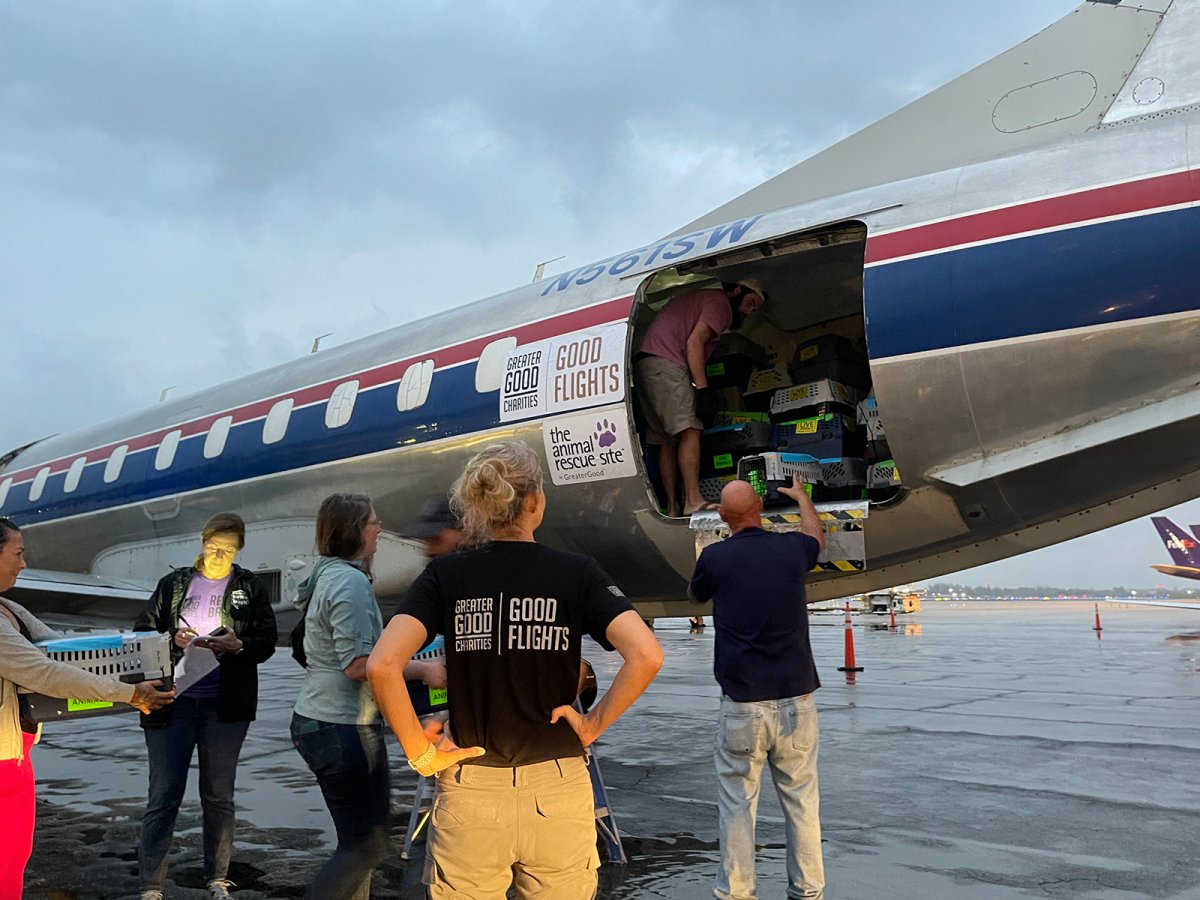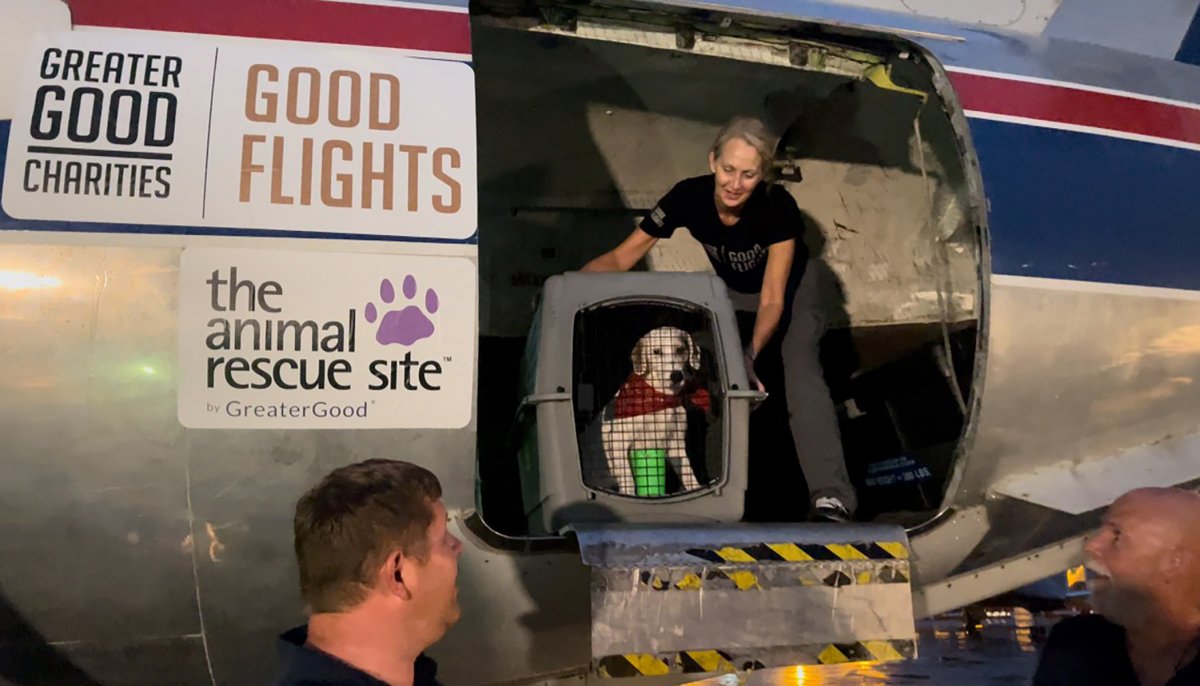During a hurricane or a violent storm, pets are usually exposed to risks such as debris wounds or broken limbs injuries, but they are also exposed to other life-threatening dangers that can affect them after the storm has passed.
While the best course of action would be to get your dog checked by the nearest veterinarian, it may not be possible during an emergency, especially when clinics already have to deal with the many displaced dogs the storm has left behind.
But there are ways you can help your dog yourself until you have the chance to have it checked by a veterinarian. Newsweek has gathered expert advice on how to help dogs in the aftermath of a hurricane or similar catastrophies.
How To Help Your Dog After A Hurricane
Injuries
Dr. Christian Broadhurst, a senior veterinarian at Clay County Humane Society, told Newsweek that the most common post-hurricane injuries are usually associated with dogs stepping on broken glass, sharp metal, broken branches, and any other kinds of debris, and on the spot, you can offer the dog some first aid.
According to Broadhurst, that entails cleaning their wound out, making sure there's no junk or grass or dirt, and you can use tap water for that.
"And then once it's clean," he added, "certainly put a light dressing or a wrap on it, nothing too tight because you definitely don't want to cut off circulation, and if it's a shallow abrasion, topical antibiotics Polysporin, or something along those lines is a fine general disinfectant."
Infections From Toxic Water
According to Dogster during storms, the flood waters eventually mix with septic and sewer waste, garbage, chemicals, and debris among other things, forming a stagnant, toxic stew, and when a dog enters in contact with this water they are at risk of contamination.
Owners should decontaminate their pets from flood water residue as soon as possible after natural disasters, and they can do so by using common products like dishwashing soap to clean out the chemical components from the dog's fur and skin.
Vector-Born Diseases
These pools of stagnant toxic stew are fertile breeding grounds for mosquitoes, ticks, sandflies, and other flying insects, which can infect your dog with can infect a dog with vector-borne diseases are infections transmitted via bites.
Mosquitoes are problematic during rainy season, and if your dog is not receiving regular parasite protection, it faces a greater risk for diseases like West Nile virus and heartworm disease.
These kinds of infections can be lethal for dogs, so it's important for owners to keep their pet's vaccinations up to date and get a veterinary check when possible.
What To Do If You've Found A Lost Dog After A Hurricane
In the aftermath of hurricane Ian, the category 4 cyclone that hit Florida's Gulf Coast, claiming at least 85 victims, many pets were found displaced after being left behind by their families while escaping the catastrophic force of the hurricane.
Some animal welfare organizations prepare for this scenario by taking action in advance to make room in impacted shelters for the abundance of displaced pets. Greater Good Charities, working with shelters across the state, including those in Naples and Ft. Myers, airlifted 90 pets that were in shelters in Florida prior to the storm to new adoptive homes in the Northeast. This freed up space in the shelters for storm-impacted pets.
Liz Baker, CEO of Greater Good Charities, said: "The transport was very successful. Greater Good Charities provided much-needed space and help for shelters and shelter staff that are struggling right now that have no power, are short staffed and over capacity.
"Flying these pets up to the Northeast moves healthy, adoptable pets to areas that have more adopters and makes room for the influx of homeless and lost pets the shelters are seeing now."
If you happen to be in an affected area and you come across a lost, injured dog, there are ways you can help it, but you must first ensure you're safe as you don't want to get badly injured and take up space in local hospitals.
Take The Dog To A Shelter
According to Dr. Broadhurst, if you find a lost dog you should take it to a shelter or clinic where it can receive the help it needs, but if they can't take the pet, you can also just take a picture with your cellphone indicating the exact location, and volunteers will pick up the dog at the next rescue mission.
If you have a car and are able to give the dog a lift to the shelter or clinic, you should first make sure you're safe around the pet.
Dr. Broadhurst suggests: "My personal rule of thumb is to open the car door and say 'come here boy' and if the dog jumps in, take it wherever you can, because that dog obviously does not belong there, it's used to car rides, is friendly with people, and it's okay to go with strangers and you can take him into a shelter or clinic."
If the dog doesn't jump in the car but it's not safe to leave it where it is, you can try to bribe him with food.
"If you have something, if he's looking skittish like he's gonna come to you but you're not 100 percent sure, break a chicken nugget or something along those lines. Dogs like this may be just very very scared not knowing what's going on, and food is usually one of the quickest ways to their hearts and to their trust."
Take The Dog To Your Home (Temporarily)
When natural disasters take place usually charities fill up quickly and volunteers may not be able to help more pets than they already are, so if you're able to help a dog and are in the condition do to so, then you should go for it, even if it means keeping the pet for a while.
Dr. Broadhurst says that if you have the ability to take an animal in your home for a short term or even a couple of weeks, depending on how serious the damage is in your local area, that will go a long way towards easing the pressures on a lot of the local shelters and clinics.
"If you rescue a dog and you can take him into your home, rest assured his owners are eventually going to be looking for him, and if you can be the person that helped reunite this dog with his owner, by putting yourself out just a little bit and keeping the dog in the home, it's a wonderful thing to do!" he said.

How You Can Help With Hurricane Ian From Far Away
If you're not there physically you can still help by funding local volunteers and charities, who will need funds for anything from medicines to trips to rehome the pets.
The most significant help you can give, according to Broadhurst, is financial support, reaching out to non-profit organizations like the Humane Society of the United States or the ASPCA.
"There are several organizations out there that do specifically bring in relief for emergency situations especially once a state of emergency has been declared. If you are unable to do that, you can certainly look to more local organizations to donate money."
How To Find Your Dog After A Hurricane
If you lost track of your pet during the hurricane and still haven't found it, don't despair, there are a few places you can check and things you can do to get your pooch back.
You should first check local shelters as that's the place where your dog is most likely to be since that's where volunteers keep them safe after rescuing them. You should also check local veterinarian surgeries because if your dog was badly injured, the volunteers may have taken it for treatment.
If you still can't find your dog it's time to use the wide web. You should first make an identity kit for your cat, as detailed as possible, and advertise it on social media platforms, asking your friends and family to share.
Once you find your dog, take into account the fact that it just went through a pretty traumatic event and you don't know how it may react. You should not approach them directly or call them if they're on the run outside and do not engage in direct eye contact, as it can be scary for them at this time.
The best thing to do in this instance is to just sit or lie on the ground, indicating a safe and submissive posture. It's also a good idea to bring some of your dog's favorite treats and toys with you, encouraging them to approach you, and feel safe.
How To Prepare For Hurricanes When You Have A Dog
If you live in a hurricane-prone area, you might want to consider preparing your dog for the eventuality of another hurricane before it happens.
The first thing you should do is to microchip your dog, this way it can easily be returned to you in case it gets lost during a catastrophe. Your dog should also wear a collar and ID tags including your contact information.
The American Kennel Club (AKC) also advises doing some hurricane-related preventive care for your dog. Because hurricanes bring heavy rains and flooding, which can lead to an increased prevalence of illnesses such as heartworm disease and leptospirosis you should keep vaccinations and parasite prevention medications up-to-date.
You can also make an emergency-escape plan for your dog, and your kit should include all the essentials your pup will need to ride out the storm, like food and water, a leash, toys and treats, and any medications among other things.
How To Keep Your Dog Calm During A Storm and Hurricane
Because of their survival instincts, dogs are afraid of loud noises, and whenever there is a storm they tend to get quite nervous. According to the American Kennel Club in this case the best thing you can do for your dog is to let them go to their "safe space", avoiding punishing them for their behavior during thunderstorms including destruction and whining.
Providing background noise, like white noises, helps distract your dog from the storm, and to keep them entertained you can also bribe them with treats and chew toys. Calming treats, CBD oil, kibbles, or anxiety vests are also helpful.
You can also prepare your home for the event in advance, by installing hurricane windows to block out the storm or even just by pulling the shades, which will block lighting flashes as well as some of the sounds of the storm.
It's also very important for dog owners to stay calm during the storm. Because dogs recognize many of their owner's emotions and respond to them if their owner is stressed a dog is very likely to be stressed too.

Uncommon Knowledge
Newsweek is committed to challenging conventional wisdom and finding connections in the search for common ground.
Newsweek is committed to challenging conventional wisdom and finding connections in the search for common ground.
About the writer
Maria Azzurra Volpe is a Newsweek Lifestyle Reporter based in London. Her focus is reporting on lifestyle and trends-related stories, ... Read more
To read how Newsweek uses AI as a newsroom tool, Click here.






